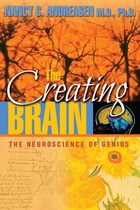
Andreasen explains here how the brain produces creative breakthroughs in art, literature, and science, revealing that creativity is not the same thing as intelligence. She scrutinizes the complex factors involved in the development of creativity, including the role of patrons and mentors, "non-standard" educations, and the possession of an "omnivorous" vision. A fascinating interview with acclaimed playwright Neil Simon sheds further light on the creative process.The relationship between genius and insanity also plays an important role in Andreasen's examination. Drawing on her studies of writers in the Iowa Writers' Workshop and other scientific evidence, Andreasen asserts that while creativity may sometimes be linked to mental disorders and may be partially due to familial/genetic factors, neither is inevitable nor needed for creativity to flourish.
Scientist's increasing understanding of the brain's plasticity suggests even more possibilities for nurturing the creative drive, and Andreasen looks ahead to exciting implications for child-rearing and education. The Creating Brain presents an inspiring vision for a future where everyone—not just artists or writers—can fulfill their creative capacity.

A child crashes to the ground from the monkey bars head-first. A high school student prepares for months to take the SAT. A grandmother slowly slips away from her family through the deadly progression of Alzheimer’s Disease. Whether we realize it or not, the importance of brain health to our daily lives goes far beyond just being able to walk and talk. The Dana Guide to Brain Health offers the first comprehensive home medical reference book on the brain, providing an unparalleled, authoritative guide to improving the fitness of our brains and, ultimately, enriching our lives.
With contributions from over one hundred of the most prominent scientists and clinicians in the United States, The Dana Guide to Brain Health is an extensive and wholly accessible manual on the workings of the human brain. This richly illustrated volume contains a wealth of facts and advice, on simple yet effective ways to take care of our brains; the intimate connection between brain health and body health; brain development from the prenatal period through adulthood; and how we learn, remember, and imagine.
The brain is far too important to be excluded any longer from our daily health concerns. The Dana Guide to Brain Health remedies this oversight with a clearly written, definitive map to our brains that reveals how we can take care of them in order to sustain a long and rich life.

He first examines "lifespan neuroethics" and considers how brain development defines human life, from when an embryo develops a brain and could be considered "one of us" to the issues raised as the brain ages, such as whether we should have complete freedom to extend our lives and enhance our brains through the use of genetics, pharmaceuticals, and training.
Gazzaniga also considers the challenges posed to the justice system by new discoveries in neuroscience. Recent findings suggest that our brain has already made a decision before we become fully aware of doing so, raising the question of whether the concept of personal responsibility can remain a fundamental tenet of the law. Gazzaniga argues that as neuroscience learns more about the unreliability of human memory, the very foundation of trial law will be challenged.
Gazzaniga then discusses a radical re-evaluation of the nature of moral belief, as he not only looks at possibly manipulating the part of the brain that creates beliefs but also explores how scientific research is building a brain-based account of moral reasoning.
The Ethical Brain is a groundbreaking volume that presents neuroscience's loaded findings—and their ethical implications—in an engaging and readable manner, offering an incisive and thoughtful analysis of the medical ethics challenges confronting modern society at the dawn of the twenty-first century.
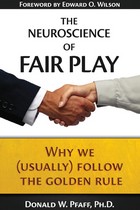
Pfaff, the researcher who first discovered the connections between specific brain circuits and certain behaviors, contends that the basic ethics governing our everyday lives can be traced directly to brain circuitry. Writing with popular science journalist Sandra J. Ackerman, he explains in this clear and concise account how specific brain signals induce us to consider our actions as if they were directed at ourselves—and subsequently lead us to treat others as we wish to be treated. Brain hormones are a part of this complicated process, and The Neuroscience of Fair Play discusses how brain hormones can catalyze behaviors with moral implications in such areas as self-sacrifice, parental love, friendship, and violent aggression.
Drawing on his own research and other recent studies in brain science, Pfaff offers a thought-provoking hypothesis for why certain ethical codes and ideas have remained constant across human societies and cultures throughout the world and over the centuries of history. An unprecedented and provocative investigation, The Neuroscience of Fair Play offers a new perspective on the increasingly important intersection of neuroscience and ethics.
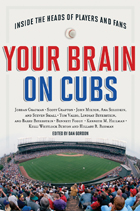
A group of today’s leading science writers and neuroscientists explore here the ways that our brain functions when we participate in sports as fans, athletes, and coaches, taking baseball as the quintessential sport for all three perspectives. The contributors tackle such questions as: How does a player hit a ninety-mile-per-hour fastball when he barely has time to visually register it? Why do fans remain devotedly loyal year after year? And what allows them to believe in superstitions, such as a curse? Other topics investigated in the book include how a ballplayer’s brain changes as he gains experience and expertise, why there are a higher percentage of left-handers in the major leagues compared to the general population, and the ethical implications of neurological performance enhancement.
An expertly written and thought-provoking read, Your Brain on Cubs challenges us to reevaluate the nature of the sports fan and the athlete, revealing the scientific complexity underlying the seemingly black-and-white world of wins and losses.

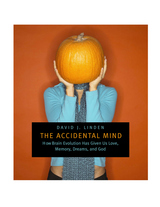
You've probably seen it before: a human brain dramatically lit from the side, the camera circling it like a helicopter shot of Stonehenge, and a modulated baritone voice exalting the brain's elegant design in reverent tones.
To which this book says: Pure nonsense. In a work at once deeply learned and wonderfully accessible, the neuroscientist David Linden counters the widespread assumption that the brain is a paragon of design--and in its place gives us a compelling explanation of how the brain's serendipitous evolution has resulted in nothing short of our humanity. A guide to the strange and often illogical world of neural function, The Accidental Mind shows how the brain is not an optimized, general-purpose problem-solving machine, but rather a weird agglomeration of ad-hoc solutions that have been piled on through millions of years of evolutionary history. Moreover, Linden tells us how the constraints of evolved brain design have ultimately led to almost every transcendent human foible: our long childhoods, our extensive memory capacity, our search for love and long-term relationships, our need to create compelling narrative, and, ultimately, the universal cultural impulse to create both religious and scientific explanations. With forays into evolutionary biology, this analysis of mental function answers some of our most common questions about how we've come to be who we are.
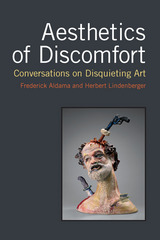

Like all cellular organisms, humans run on electricity. Slight imbalances of electric charge across cell membranes result in sensation, movement, awareness, and thinking—nearly everything we associate with being alive. Robert Campenot offers a comprehensive overview of animal electricity, examining its physiological mechanisms as well as the experimental discoveries that form the basis for our modern understanding of nervous systems across the animal kingdom.
Cells work much like batteries. Concentration gradients of sodium and potassium cause these ions to flow in and out of cells by way of protein channels, creating tiny voltages across the cell membrane. The cellular mechanisms that switch these ion currents on and off drive all the functions associated with animal nervous systems, from nerve impulses and heartbeats to the 600-volt shocks produced by electric eels.
Campenot’s examination of the nervous system is presented in the context of ideas as they evolved in the past, as well as today’s research and its future implications. The discussion ranges from the pre-Renaissance notion of animal spirits and Galvani’s eighteenth-century discovery of animal electricity, to modern insights into how electrical activity produces learning and how electrical signals in the cortex can be used to connect the brains of paralyzed individuals to limbs or prosthetic devices. Campenot provides the necessary scientific background to make the book highly accessible for general readers while conveying much about the process of scientific discovery.
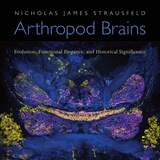
In The Descent of Man, Charles Darwin proposed that an ant’s brain, no larger than a pin’s head, must be sophisticated to accomplish all that it does. Yet today many people still find it surprising that insects and other arthropods show behaviors that are much more complex than innate reflexes. They are products of versatile brains which, in a sense, think.
Fascinating in their own right, arthropods provide fundamental insights into how brains process and organize sensory information to produce learning, strategizing, cooperation, and sociality. Nicholas Strausfeld elucidates the evolution of this knowledge, beginning with nineteenth-century debates about how similar arthropod brains were to vertebrate brains. This exchange, he shows, had a profound and far-reaching impact on attitudes toward evolution and animal origins. Many renowned scientists, including Sigmund Freud, cut their professional teeth studying arthropod nervous systems. The greatest neuroanatomist of them all, Santiago Ramón y Cajal—founder of the neuron doctrine—was awed by similarities between insect and mammalian brains.
Writing in a style that will appeal to a broad readership, Strausfeld weaves anatomical observations with evidence from molecular biology, neuroethology, cladistics, and the fossil record to explore the neurobiology of the largest phylum on earth—and one that is crucial to the well-being of our planet. Highly informative and richly illustrated, Arthropod Brains offers an original synthesis drawing on many fields, and a comprehensive reference that will serve biologists for years to come.
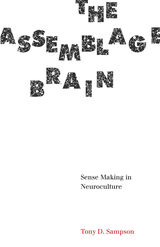
Once upon a time, neuroscience was born. A dazzling array of neurotechnologies emerged that, according to popular belief, have finally begun to unlock the secrets of the brain. But as the brain sciences now extend into all corners of cultural, social, political, and economic life, a yet newer world has taken shape: “neuroculture,” which goes further than ever before to tackle the profound ethical implications we face in consequence.
The Assemblage Brain unveils a major new concept of sense making, one that challenges conventional scientific and philosophical understandings of the brain. Drawing on Deleuze and Guattari, Tony D. Sampson calls for a radical critical theory that operates in the interferences between philosophy, science, art, and politics. From this novel perspective the book is structured around two questions: “What can be done to a brain?” and “What can a brain do?” Sampson examines the rise of neuroeconomics in informing significant developments in computer work, marketing, and the neuropharmaceutical control of inattentiveness in the classroom. Moving beyond the neurocapitalist framework, he then reestablishes a place for proto-subjectivity in which biological and cultural distinctions are reintegrated in an understanding of the brain as an assemblage.
The Assemblage Brain unravels the conventional image of thought that underpins many scientific and philosophical accounts of how sense is produced, providing a new view of our current time in which capitalism and the neurosciences endeavor to colonize the brain.
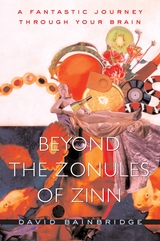
In his latest book, David Bainbridge combines an otherworldly journey through the central nervous system with an accessible and entertaining account of how the brain's anatomy has often misled anatomists about its function. Bainbridge uses the structure of the brain to set his book apart from the many volumes that focus on brain function. He shows that for hundreds of years, natural philosophers have been interested in the gray matter inside our skulls, but all they had to go on was its structure. Almost every knob, protrusion, canal, and crease was named before anyone had an inkling of what it did--a kind of biological terra incognita with many weird and wonderful names: the zonules of Zinn, the obex ("the most Scrabble-friendly word in all of neuroanatomy"), the aqueduct of Sylvius, the tract of Goll.
This uniquely accessible approach lays out what is known about the brain (its structure), what we can hope to know (its function), and what we may never know (its evolution). Along the way Bainbridge tells lots of wonderful stories about the "two pounds of blancmange" within our skulls, and tells them all with wit and style.

Robotic exoskeletons that allow stroke survivors to regain use of their limbs, 3D-printed replacement body parts, and dozens of other innovations still in schematic design are revolutionizing the treatment of debilitating injuries and nervous system disorders. What all these technologies have in common is that they are modeled after engineering strategies found in nature—strategies developed by a vast array of organisms over eons of evolutionary trial and error.
Eugene Goldfield lays out many principles of engineering found in the natural world, with a focus on how evolutionary and developmental adaptations, such as sensory organs and spinal cords, function within complex organisms. He shows how the component parts of highly coordinated structures organize themselves into autonomous functional systems. For example, when people walk, spinal cord neurons generate coordinated signals that continuously reorganize patterns of muscle activations during the gait cycle. This self-organizing capacity is just one of many qualities that allow biological systems to be robust, adaptive, anticipatory, and self-repairing. To exploit the full potential of technologies designed to interact seamlessly with human bodies, properties like these must be better understood and harnessed at every level, from molecules to cells to organ systems.
Bioinspired Devices brings together insights from a wide range of fields. A member of the Wyss Institute for Biologically Inspired Engineering, Goldfield offers an insider’s view of cutting-edge research, and envisions a future in which synthetic and biological devices share energy sources and control, blurring the boundary between nature and medicine.
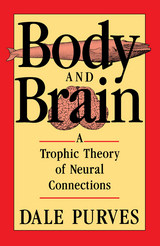
The major goal of developmental neurobiology is to understand how the nervous system is put together. A central theme that has emerged from research in this field over the last several decades is the crucial role of trophic interactions in neural assembly, and indeed throughout an animal's life. Trophic—which means nutritive—refers to long-term interdependencies between nerve cells and the cells they innervate.
The theory of trophic effects presented in this book offers an explanation of how the vertebrate nervous system is related to—and regulated by—the body it serves. The theory rationalizes the nervous system's accommodation, throughout life, to the changing size and form of the body it tenants, indicating the way connections between nerve cells change in response to stimuli as diverse as growth, injury, experience, and natural selection.
Dale Purves, a leading neurobiologist best known for his work on the formation and maintenance of synaptic connections, presents this theory within the historical setting of earlier ideas about neural organization—from Weiss's theory of functional reorganization to the chemoaffinity theory championed by Sperry. In addition to illuminating eighty years of work on trophic interactions, this book asks its own compelling questions: Are trophic interactions characteristic of all animals or only of those with complex nervous systems? Are trophic interactions related to learning? What does the trophic theory of neural connections imply about the currently fashionable view that the nervous system operates according to Darwinian principles?
Purves lays the theoretical foundation for practical exploration of trophic interactions as they apply to neural connections, a pursuit that will help us understand how our own nervous systems generate change. The ideas in this book not only enrich neurobiology but also convey the profound relevance of neuroscience to other fields of life science.

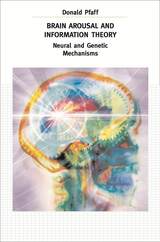
Arousal is fundamental to all cognition. It is intuitively obvious, absolutely necessary, but what exactly is it? In Brain Arousal and Information Theory, Donald Pfaff presents a daring perspective on this long-standing puzzle. Pfaff argues that, beneath our mental functions and emotional dispositions, a primitive neuronal system governs arousal. Employing the simple but powerful framework of information theory, Pfaff revolutionizes our understanding of arousal systems in the brain.
Starting with a review of the neuroanatomical, neurophysiological, and neurochemical components of arousal, Pfaff asks us to look at the gene networks and neural pathways underlying the brain’s arousal systems much as a design engineer would contemplate information systems. This allows Pfaff to postulate that there is a bilaterally symmetric, bipolar system universal among mammals that readies the animal or the human being to respond to stimuli, initiate voluntary locomotion, and react to emotional challenges. Applying his hypothesis to heightened states of arousal—sex and fear—Pfaff shows us how his theory opens new scientific approaches to understanding the structure of brain arousal.
A major synthesis of disparate data by a preeminent neuroscientist, Brain Arousal and Information Theory challenges current thinking about cognition and behavior. Whether you subscribe to Pfaff’s theory or not, this book will stimulate debate about the nature of arousal itself.
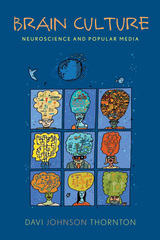
Brain Culture investigates the American obsession with the health of the brain. The brain has become more than a bodily organ, acquiring a near-mystical status. The message that this organ is the key to everything is everywhere--in self-help books that tell us to work on our brains to achieve happiness and enlightenment, in drug advertisements that promise a few tweaks to our brain chemistry will cure us of our discontents, and in politicians' speeches that tell us that our brains are national resources essential to our economic prosperity.
Davi Johnson Thornton looks at these familiar messages, tracing the ways that brain science and colorful brain images produced by novel scientific technologies are taken up and distributed in popular media. She tracks the impact of the message that, "you are your brain" across multiple contemporary contexts, analyzing its influence on child development, family life, education, and public policy. Brain Culture shows that our fixation on the brain is not simply a reaction to scientific progress, but a cultural phenomenon deeply tied to social and political values of individualism and limitless achievement.

Movement has long been considered the most obvious expression of brain activity and its correlative, mental activity. By studying movement, the neurophysiologist hopes to penetrate the interior of the living being and uncover the hidden source of action and its clues to the origin of life. We presume a role for the brain in movement—but should the brain be viewed simply as a machine that reacts to diverse stimuli, or is it an intelligent machine that organizes and controls not only itself but also the world around it?
Drawing upon the many disciplines that have contributed to brain research—anatomy, physiology, clinical neurology, psychology, psychiatry—Marc Jeannerod traces three centuries of ideas about movement and the brain. His critique of neural science takes into account the work of thinkers ranging from Descartes and Willis to Held, Hubel and Wiesel, Piaget and Chomsky. In his historical survey Jeannerod sees parallels between the influential neurological theories and dominating philosophical questions of the time: What is the nature of the soul? How does knowledge originate? What is the relation between the living organism and its milieu? Jeannerod's elegant arguments demonstrate that the “brain-movement problem” is the essential paradigm of the “brain-mind problem.” He advances a view of the neural organization of movement that has far-reaching implications for psychology and all neural sciences.
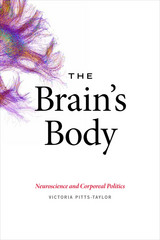
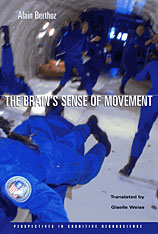
The neuroscientist Alain Berthoz experimented on Russian astronauts in space to answer these questions: How does weightlessness affect motion? How are motion and three-dimensional space perceived? In this erudite and witty book, Berthoz describes how human beings on earth perceive and control bodily movement. Reviewing a wealth of research in neurophysiology and experimental psychology, he argues for a rethinking of the traditional separation between action and perception, and for the division of perception into five senses.
In Berthoz’s view, perception and cognition are inherently predictive, functioning to allow us to anticipate the consequences of current or potential actions. The brain acts like a simulator that is constantly inventing models to project onto the changing world, models that are corrected by steady, minute feedback from the world. We move in the direction we are looking, anticipate the trajectory of a falling ball, recover when we stumble, and continually update our own physical position, all thanks to this sense of movement.
This interpretation of perception and action allows Berthoz, in The Brain’s Sense of Movement, to focus on psychological phenomena largely ignored in standard texts: proprioception and kinaesthesis, the mechanisms that maintain balance and coordinate actions, and basic perceptual and memory processes involved in navigation.

Although cerebral dominance, the specialization of each side of the brain for different functions, was discovered in the 1860s, almost nothing was known for many years about its biological foundations, the study of which has undergone what can only be described as a revolution in the past decade and a half.
Norman Geschwind and Albert Galaburda, two of the leaders of this new field, have assembled a distinguished group of investigators, each a pioneer in some aspect of the biology of dominance. The authors document human brain asymmetry at gross and microscopic levels in both adults and fetuses, its visualization in life by radiological methods, and its manifestation in brain waves. The evolutionary history of brain asymmetry over more than 300,000 years is shown in fossil skulls of humans and apes. In a dramatic reversal of older beliefs, asymmetry of anatomy, function, and chemistry has been demonstrated in many nonhuman species, and experiments have shown the role of hormones and other prenatal influences in the production of asymmetry. The surprising associations of non-right-handedness with twinning and immune disorders are discussed, as well as the asymmetrical malformation of the cortex in childhood dyslexia.
This volume, combining scholarly authority and the excitement of the birth of a new discipline, will be welcomed by those to whom the implications of dominance are becoming evident—neuroscientists, neurologists, linguists, psychologists, experts in learning disorders, speech pathologists—and by specialists in nearly every branch of biology, medicine, and psychology.

Chemically Imbalanced is a field report on how ordinary people dealing with common problems explain their suffering, how they’re increasingly turning to the thin and mechanistic language of the “body/brain,” and what these encounters might tell us. Drawing on interviews with people dealing with struggles such as underperformance in school or work, grief after the end of a relationship, or disappointment with how their life is unfolding, Joseph E. Davis reveals the profound revolution in consciousness that is underway. We now see suffering as an imbalance in the brain that needs to be fixed, usually through chemical means. This has rippled into our social and cultural conversations, and it has affected how we, as a society, imagine ourselves and envision what constitutes a good life. Davis warns that what we envision as a neurological revolution, in which suffering is a mechanistic problem, has troubling and entrapping consequences. And he makes the case that by turning away from an interpretive, meaning-making view of ourselves, we thwart our chances to enrich our souls and learn important truths about ourselves and the social conditions under which we live.

Everyday suffering—those conditions or feelings brought on by trying circumstances that arise in everyone’s lives—is something that humans have grappled with for millennia. But the last decades have seen a drastic change in the way we approach it. In the past, a person going through a time of difficulty might keep a journal or see a therapist, but now the psychological has been replaced by the biological: instead of treating the heart, soul, and mind, we take a pill to treat the brain.
Chemically Imbalanced is a field report on how ordinary people dealing with common problems explain their suffering, how they’re increasingly turning to the thin and mechanistic language of the “body/brain,” and what these encounters might tell us. Drawing on interviews with people dealing with struggles such as underperformance in school or work, grief after the end of a relationship, or disappointment with how their life is unfolding, Joseph E. Davis reveals the profound revolution in consciousness that is underway. We now see suffering as an imbalance in the brain that needs to be fixed, usually through chemical means. This has rippled into our social and cultural conversations, and it has affected how we, as a society, imagine ourselves and envision what constitutes a good life. Davis warns that what we envision as a neurological revolution, in which suffering is a mechanistic problem, has troubling and entrapping consequences. And he makes the case that by turning away from an interpretive, meaning-making view of ourselves, we thwart our chances to enrich our souls and learn important truths about ourselves and the social conditions under which we live.
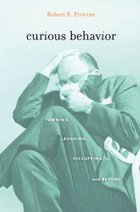
Robert Provine boldly goes where other scientists seldom tread—in search of hiccups, coughs, yawns, sneezes, and other lowly, undignified human behaviors. Upon investigation, these instinctive acts bear the imprint of our evolutionary origins and can be uniquely valuable tools for understanding how the human brain works and what makes us different from other species.
Many activities showcased in Curious Behavior are contagious, but none surpasses yawning in this regard—just reading the word can make one succumb. Though we often take it as a sign of sleepiness or boredom, yawning holds clues to the development of our sociality and ability to empathize with others. Its inescapable transmission reminds us that we are sometimes unaware, neurologically programmed beasts of the herd. Other neglected behaviors yield similar revelations. Tickling, we learn, may be the key to programming personhood into robots. Coughing comes in musical, medical, and social varieties. Farting and belching have import for the evolution of human speech. And prenatal behavior is offered as the strangest exhibit of all, defying postnatal logic in every way. Our earthiest acts define Homo sapiens as much as language, bipedalism, tool use, and other more studied characteristics.
As Provine guides us through peculiarities right under our noses, he beckons us to follow with self-experiments: tickling our own feet, keeping a log of when we laugh, and attempting to suppress yawns and sneezes. Such humble investigations provide fodder for grade school science projects as well as doctoral dissertations. Small Science can yield big rewards.
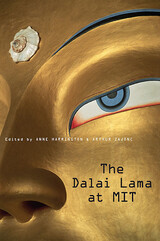
Their meeting captured headlines; the waiting list for tickets was nearly 2000 names long. If you were unable to attend, this book will take you there. Including both the papers given at the conference, and the animated discussion and debate that followed, The Dalai Lama at MIT reveals scientists and monks reaching across a cultural divide, to share insights, studies, and enduring questions.
Is there any substance to monks’ claims that meditation can provide astonishing memories for words and images? Is there any neuroscientific evidence that meditation will help you pay attention, think better, control and even eliminate negative emotions? Are Buddhists right to make compassion a fundamental human emotion, and Western scientists wrong to have neglected it?
The Dalai Lama at MIT shows scientists finding startling support for some Buddhist claims, Buddhists eager to participate in neuroscientific experiments, as well as misunderstandings and laughter. Those in white coats and those in orange robes agree that joining forces could bring new light to the study of human minds.
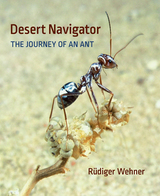
Winner of the Association of American Publishers PROSE Award for Excellence in Biological and Life Sciences
A world-renowned researcher of animal behavior reveals the extraordinary orienteering skills of desert ants, offering a thrilling account of the sophisticated ways insects function in their natural environments.
Cataglyphis desert ants are agile ultrarunners who can tolerate near-lethal temperatures when they forage in the hot midday sun. But it is their remarkable navigational abilities that make these ants so fascinating to study. Whether in the Sahara or its ecological equivalents in the Namib Desert and Australian Outback, the Cataglyphis navigators can set out foraging across vast expanses of desert terrain in search of prey, and then find the shortest way home. For almost half a century, Rüdiger Wehner and his collaborators have devised elegant experiments to unmask how they do it.
Through a lively and lucid narrative, Desert Navigator offers a firsthand look at the extraordinary navigational skills of these charismatic desert dwellers and the experiments that revealed how they strategize and solve complex problems. Wehner and his team discovered that these insect navigators use visual cues in the sky that humans are unable to see, the Earth’s magnetic field, wind direction, a step counter, and panoramic “snapshots” of landmarks, among other resources. The ants combine all of this information to steer an optimal course. At any given time during their long journey, they know exactly where to go. It is no wonder these nimble and versatile creatures have become models in the study of animal navigation.
Desert Navigator brings to light the marvelous capacity and complexity found in these remarkable insects and shows us how mini brains can solve mega tasks.

Dyslexia and Development presents the latest findings of neurobiological research, which suggest a link between seemingly minor brain abnormalities and epilepsy, learning disorders, and autism. The authors focus on the plasticity of the developing nervous system and the possible role of subtle early brain injury in the emergence of these disorders, particularly dyslexia.
The distinguished contributors to this volume examine epidemiological and clinical issues that may make the developing brain more vulnerable to environmental and genetic influences, which can in turn lead to abnormal brain plasticity and behavior. Although major forms of brain malformation have been clearly associated with functional deficits, mild forms have historically been ignored or trivialized; this book supports the hypothesis that several types of such malformation reflect brain injury during critical stages of development, and also the premise that more and more disturbances of thought and behavior stem from abnormalities of brain organization.
Neurologists and neurobiologists, psychologists, psycholinguists, psychiatrists, and special educators will find here a guide to more enlightened understanding and more effective treatment of dyslexia. In fact, the book emphasizes the positive aspect of the neurobiological deviation that dyslexic brains seem to show, along with the observation that people with such brains are often quite creative and extraordinary, rather than handicapped. In turn, the revised consideration of dyslexia should lead to more serious attention to other disturbances of childhood behavior as problems in developmental neurology, as well as to a deeper analysis of possible neurological bases for individual differences in normal behavior and personality.

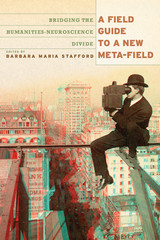
Barbara Stafford is a pioneering art historian whose research has long helped to bridge the divide between the humanities and cognitive sciences. In A Field Guide to a New Meta-Field, she marshals a distinguished group of thinkers to forge a ground-breaking dialogue between the emerging brain sciences, the liberal arts, and social sciences.
Stafford’s book examines meaning and mental function from this dual experimental perspective. The wide-ranging essays included here—from Frank Echenhofer’s foray into shamanist hallucinogenic visions to David Bashwiner’s analysis of emotion and danceability—develop a common language for implementing programmatic and institutional change. Demonstrating how formerly divided fields are converging around shared issues, A Field Guide to a New Meta-Field maps a high-level, crossdisciplinary adventure from one of our leading figures in visual studies.
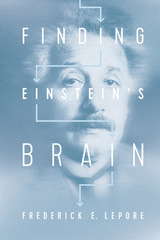
Following his death in 1955, Einstein’s brain was removed and preserved, but has never been fully or systematically studied. In fact, the sections are not even all in one place, and some are mysteriously unaccounted for! In this compelling tale, Frederick E. Lepore delves into the strange, elusive afterlife of Einstein’s brain, the controversy surrounding its use, and what its study represents for brain and/or intelligence studies.
Carefully reacting to the skepticism of 21st century neuroscience, Lepore more broadly examines the philosophical, medical, and scientific implications of brain-examination. Is the brain simply a computer? If so, how close are we to artificially creating a human brain? Could scientists create a second Einstein? This “biography of a brain” attempts to answer these questions, exploring what made Einstein’s brain anatomy exceptional, and how “found” photographs--discovered more than a half a century after his death--may begin to uncover the nature of genius.

Here is a brief but comprehensive tour of the physiology of vision, guided by one of the grand masters of the discipline. Offering first a solid grounding in structure and function, the book emphasizes those areas that the author considers to be of most significance in current research. Much attention is given to the role of vision in circadian timekeeping, the development of the visual system, the effect of aging on the eye, and the provocative questions of perception and illusion.
An eminently readable text, Focus on Vision will more than satisfy the needs of students in ophthalmology, optometry, physiological optics, biology, psychology, and art. It is fully illustrated and contains lists of references and further reading. The questions at the end of each chapter may be used to test understanding or simply to excite discussion.


To make sense of this chaos, the brain must simplify the sensory inputs by creating, or inventing, the colors, sounds, smells, forms, and faces that are perceived in consciousness, which become a proxy for the chaotic world in which we live. The brain’s ability to generalize and categorize these invented perceptions, and to relate them to one another, enables it to form memories, which are not fixed representations of things past, but a dynamic and malleable function of the brain that is relational.
When formation of these worlds breaks down, neurological differences arise. Although the mechanisms that transform sensory chaos into the simplified perceptions experienced in consciousness remain elusive, Rosenfield and Ziff relate what they have learned by means of imaging brain activity and by mapping the neural circuits that comprise memory traces. In addition, the authors offer perspectives for future studies of consciousness.

A Wired Most Fascinating Book of the Year
“An important book that reminds us that navigation remains one of our most underappreciated arts.”
—Tristan Gooley, author of The Lost Art of Reading Nature’s Signs
“If you want to understand what rats can teach us about better-planned cities, why walking into a different room can help you find your car keys, or how your brain’s grid, border, and speed cells combine to give us a sense of direction, this book has all the answers.”
—The Scotsman
How is it that some of us can walk unfamiliar streets without losing our way, while the rest of us struggle even with a GPS? Navigating in uncharted territory is a remarkable feat if you stop to think about it. In this beguiling mix of science and storytelling, Michael Bond explores how we do it: how our brains make the “cognitive maps” that keep us orientated and how that anchors our sense of wellbeing. Children are instinctive explorers, developing a spatial understanding as they roam. And yet today few of us make use of the wayfinding skills that we inherited from our nomadic ancestors.
Bond tells stories of the lost and found—sailors, orienteering champions, early aviators—and explores why being lost can be such a devastating experience. He considers how our understanding of the world around us affects our psychology and helps us see how our reliance on technology may be changing who we are.
“Bond concludes that, by setting aside our GPS devices, by redesigning parts of our cities and play areas, and sometimes just by letting ourselves get lost, we can indeed revivify our ability to find our way, to the benefit of our inner world no less than the outer one.”
—Science
“A thoughtful argument about how our ability to find our way is integral to our nature.”
—Sunday Times
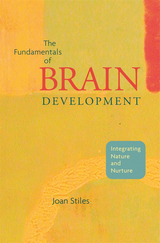
In a remarkable synthesis of the research of the last two decades, a leading developmental neuroscientist provides psychologists with a sophisticated introduction to the brain—the system that underpins the functions that they study.
In clear terms, with ample illustrations, Joan Stiles explains the complexities of genetic variation and transcription, and the variable paths of neural development, from embryology through early childhood. She describes early developmental processes from gene expression to physiology to behavior. Sections on clinical correlations show the consequences for later physiological, neurological, or psychological disturbances in neural development.
As Stiles shows, brain development is far more complex and dynamic than is often assumed in debates about nature vs. nurture, nativism vs. cultural learning. Inherited and experienced factors interact constantly in an ever-changing organism. The key question is, what developmental processes give rise to particular structures or mechanisms?
A landmark of synthesis and interdisciplinary illumination, The Fundamentals of Brain Development will enrich discussion of developmental processes and more rigorously define the terms that are central to psychological debates.
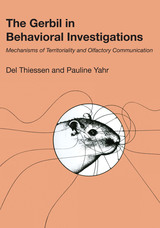
In this comprehensive account of olfactory communication and territorial behavior in the Mongolian gerbil, Del Thiessen and PaulineYahr provide the first detailed study of the neurological and physiological mechanisms that control these basic functions. In addition to explaining the links between hormones, genes, olfactory cues, and territorial acts, they also offer a more general picture of gerbil behavior, as well as a brief look at other mammalian species that communicate social status by way of olfactory messages.
Territorial behavior, as defined by the authors, includes all acts that are restricted to a particular area and are crucial for successful reproduction. In the Mongolian gerbil, and probably in other mammals as well, territoriality is controlled by sex hormones acting on specific areas of the central nervous system. Hormones from the gonads apparently act in the brain by altering the genetic apparatus controlling biochemicals used in neural communication. Without these hormones, the animal is socially inert and unable to transmit genes to the next generation. The authors conclude from the results of over ten years of investigation that the most complex social interactions depend on the integrity of the hormone system and its constant tuning by olfactory stimuli.
The book incorporates a review of all previously known studies of gerbil behavior and representative data for many other scent-marking species. A stereotaxic brain atlas for the gerbil is a feature that will be especially helpful to other researchers. The book's eclectic nature should make it valuable to anyone concerned with territorial behavior, hormones and behavior, or brain processes, as well as to those who are specifically interested in the Mongolian gerbil.
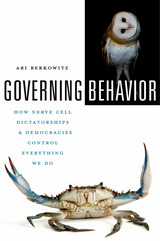
From simple reflexes to complex choreographies of movement, all animal behavior is governed by a nervous system. But what kind of government is it—a dictatorship or a democracy?
Nervous systems consist of circuits of interconnected nerve cells (neurons) that transmit and receive information via electrical signals. Every moment, each neuron adds up stimulating and inhibiting inputs from many other neurons to determine whether to send an electrical signal to its recipients. Some circuits are dominated by a single “dictator” neuron that gathers information from many sources and then issues commands, such as the Mauthner neuron that triggers escape in fish. In other more “democratic” circuits, such as those mediating eye movements in monkeys, the outcome is determined by a tally of “votes” from a large population of neurons. Rhythmic movements like breathing and locomotion are generated by “government programs” within the central nervous system, but modified by a soup of chemicals and by free market–like feedback from sensory neurons. Nervous systems also use sophisticated surveillance of the surrounding environment and keep track of their own decisions in order to avoid internal conflicts. Nervous systems are not restricted to using one set of procedures at a time. They have evolved over long periods to control behaviors in whichever ways are most effective, and they essentially combine multiple forms of government simultaneously.
Engaging and accessible, Governing Behavior explains the variety of structures and strategies that control behavior, while providing an overview of thought-provoking debates and cutting-edge research in neurobiology.

This original study considers the effects of language and meaning on the brain. Jens Erik Fenstad—an expert in the fields of recursion theory, nonstandard analysis, and natural language semantics—combines current formal semantics with a geometric structure in order to trace how common nouns, properties, natural kinds, and attractors link with brain dynamics.

Is "right-brain" thought essentially creative, and "left-brain" strictly logical? Joseph B. Hellige argues that this view is far too simplistic. Surveying extensive data in the field of cognitive science, he disentangles scientific facts from popular assumptions about the brain's two hemispheres.
In Hemispheric Asymmetry, Hellige explains that the "right brain" and "left brain" are actually components of a much larger cognitive system encompassing cortical and subcortical structures, all of which interact to produce unity of thought and action. He further explores questions of whether hemispheric asymmetry is unique to humans, and how it might have evolved. This book is a valuable overview of hemispheric asymmetry and its evolutionary precedents.

Throughout his remarkable career, Donald Pfaff has demonstrated that by choosing problems and methods with care, biologists can study the molecular mechanisms of brains more complex than those of fruit flies, snails, roundworms, and other invertebrates. His half century in the lab, starting with his discovery of hormone receptors in the brains of mammals and leading to the first detailed account of a neural circuit for mammalian behavior, puts him in a unique position to survey the origins and development of behavioral neurobiology and the current state of research. How the Vertebrate Brain Regulates Behavior offers a close-up, conversational perspective on scientific struggles and successes throughout a fifty-year quest to understand how behavior is regulated in a complex organism.
In graduate school, when Pfaff expressed a desire to study behavioral regulation, his advisor suggested focusing on hormones. Pfaff’s investigation into the hormonal basis of female sexual behavior in laboratory rats led him to a comprehensive appreciation of how hormone-dependent neurons work through neural circuits to produce discrete behaviors among all vertebrates. This breakthrough, along with other researchers’ findings, established a link between molecular biology and neuroscience that opened up a fruitful new field of inquiry.
Pfaff’s approach is to focus on one solvable problem and explore it from many angles. He begins with a single observed behavior and traces its regulation through a series of biological mechanisms—from hormones to genes to neural circuits. Pfaff’s relentless pursuit of his goals continues to inspire neuroscientists today.
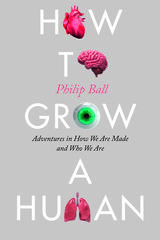
In his most mind-bending book yet, Ball makes that disconcerting question the focus of a tour through what scientists can now do in cell biology and tissue culture. He shows how these technologies could lead to tailor-made replacement organs for when ours fail, to new medical advances for repairing damage and assisting conception, and to new ways of “growing a human.” For example, it might prove possible to turn skin cells not into neurons but into eggs and sperm, or even to turn oneself into the constituent cells of embryos. Such methods would also create new options for gene editing, with all the attendant moral dilemmas. Ball argues that such advances can therefore never be about “just the science,” because they come already surrounded by a host of social narratives, preconceptions, and prejudices. But beyond even that, these developments raise questions about identity and self, birth and death, and force us to ask how mutable the human body really is—and what forms it might take in years to come.
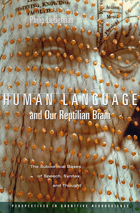
This book is an entry into the fierce current debate among psycholinguists, neuroscientists, and evolutionary theorists about the nature and origins of human language. A prominent neuroscientist here takes up the Darwinian case, using data seldom considered by psycholinguists and neurolinguists to argue that human language--though more sophisticated than all other forms of animal communication--is not a qualitatively different ability from all forms of animal communication, does not require a quantum evolutionary leap to explain it, and is not unified in a single "language instinct."
Using clinical evidence from speech-impaired patients, functional neuroimaging, and evolutionary biology to make his case, Philip Lieberman contends that human language is not a single separate module but a functional neurological system made up of many separate abilities. Language remains as it began, Lieberman argues: a device for coping with the world. But in a blow to human narcissism, he makes the case that this most remarkable human ability is a by-product of our remote reptilian ancestors' abilities to dodge hazards, seize opportunities, and live to see another day.
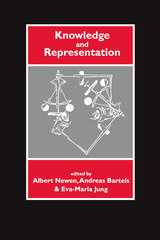
This compilation of cutting-edge philosophical and scientific research comprises a survey of recent neuroscientific research on representational systems in animals and humans. Representational systems provide their owners with useful information about their environment and are shaped by the special informational needs of the organism with respect to its environment. In this volume, the authors address the long-standing dispute about the usefulness of the notion of representation in the study of behavior systems and offer a fresh perspective on representational systems that combines philosophical insights and experimental experience.
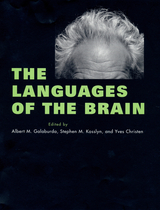
The only way we can convey our thoughts in detail to another person is through verbal language. Does this imply that our thoughts ultimately rely on words? Is there only one way in which thoughts can occur? This ambitious book takes the contrary position, arguing that many possible "languages of thought" play different roles in the life of the mind.
"Language" is more than communication. It is also a means of representing information in both working and long-term memory. It provides a set of rules for combining and manipulating those representations.
A stellar lineup of international cognitive scientists, philosophers, and artists make the book's case that the brain is multilingual. Among topics discussed in the section on verbal languages are the learning of second languages, recovering language after brain damage, and sign language, and in the section on nonverbal languages, mental imagery, representations of motor activity, and the perception and representation of space.
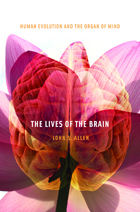
Though we have other distinguishing characteristics (walking on two legs, for instance, and relative hairlessness), the brain and the behavior it produces are what truly set us apart from the other apes and primates. And how this three-pound organ composed of water, fat, and protein turned a mammal species into the dominant animal on earth today is the story John S. Allen seeks to tell.
Adopting what he calls a “bottom-up” approach to the evolution of human behavior, Allen considers the brain as a biological organ; a collection of genes, cells, and tissues that grows, eats, and ages, and is subject to the direct effects of natural selection and the phylogenetic constraints of its ancestry. An exploration of the evolution of this critical organ based on recent work in paleoanthropology, brain anatomy and neuroimaging, molecular genetics, life history theory, and related fields, his book shows us the brain as a product of the contexts in which it evolved: phylogenetic, somatic, genetic, ecological, demographic, and ultimately, cultural-linguistic. Throughout, Allen focuses on the foundations of brain evolution rather than the evolution of behavior or cognition. This perspective demonstrates how, just as some aspects of our behavior emerge in unexpected ways from the development of certain cognitive capacities, a more nuanced understanding of behavioral evolution might develop from a clearer picture of brain evolution.
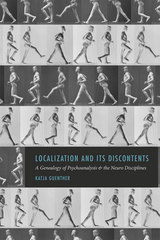
Given these differences, it is remarkable that both fields found resources for their development in the same tradition of late nineteenth-century German medicine: neuropsychiatry. In Localization and Its Discontents, Katja Guenther investigates the significance of this common history, drawing on extensive archival research in seven countries, institutional analysis, and close examination of the practical conditions of scientific and clinical work. Her remarkable accomplishment not only reframes the history of psychoanalysis and the neuro disciplines, but also offers us new ways of thinking about their future.

"The Lying Brain is a study to take seriously. Its argument is timely, clear, and of particular importance to the enlargement of our understanding of the relationships among science studies, literary studies, and technology studies."
---Ronald Schleifer, University of Oklahoma
Real and imagined machines, including mental microscopes, thought translators, and polygraphs, have long promised to detect deception in human beings. Now, via fMRI and EEG, neuroscientists seem to have found what scientists, lawyers, and law enforcement officials have sought for over a century: foolproof lie detection. But are these new lie detection technologies any different from their predecessors? The Lying Brain is the first book to explore the cultural history of an array of lie detection technologies: their ideological assumptions, the scientific and fictional literatures that create and market them, and the literacies required for their interpretation.
By examining a rich archive of materials about lie detection---from science to science fiction---The Lying Brain demonstrates the interconnections of science, literature, and popular culture in the development and dissemination of deception detection in the American cultural imagination. As Melissa Littlefield demonstrates, neuroscience is not building a more accurate lie detector; it is simply recycling centuries-old ideologies about deception and its detection.
Cover art: "Human Brain" © Denis Barbulet, courtesy of Shutterstock.com
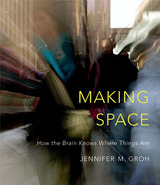
Knowing where things are seems effortless. Yet our brains devote tremendous computational power to figuring out the simplest details about spatial relationships. Going to the grocery store or finding our cell phone requires sleuthing and coordination across different sensory and motor domains. Making Space traces this mental detective work to explain how the brain creates our sense of location. But it goes further, to make the case that spatial processing permeates all our cognitive abilities, and that the brain’s systems for thinking about space may be the systems of thought itself.
Our senses measure energy in the form of light, sound, and pressure on the skin, and our brains evaluate these measurements to make inferences about objects and boundaries. Jennifer Groh describes how eyes detect electromagnetic radiation, how the brain can locate sounds by measuring differences of less than one one-thousandth of a second in how long they take to reach each ear, and how the ear’s balance organs help us monitor body posture and movement. The brain synthesizes all this neural information so that we can navigate three-dimensional space.
But the brain’s work doesn’t end there. Spatial representations do double duty in aiding memory and reasoning. This is why it is harder to remember how to get somewhere if someone else is driving, and why, if we set out to do something and forget what it was, returning to the place we started can jog our memory. In making space the brain uses powers we did not know we have.

The scientific research literature on memory is enormous. Yet until now no single book has focused on the complex interrelationships of memory and belief. This book brings together eminent scholars from neuroscience, cognitive psychology, literature, and medicine to discuss such provocative issues as “false memories,” in which people can develop vivid recollections of events that never happened; retrospective biases, in which memories of past experiences are influenced by one’s current beliefs; and implicit memory, or the way in which nonconscious influences of past experience shape current beliefs.
Ranging from cognitive, neurological, and pathological perspectives on memory and belief, to relations between conscious and nonconscious mental processes, to memory and belief in autobiographical narratives, this book will be uniquely stimulating to scholars in several academic disciplines.

Hypnosis, confabulation, source amnesia, flashbulb memories, repression--these and numerous additional topics are explored in this timely collection of essays by eminent scholars in a range of disciplines. This is the first book on memory distortion to unite contributions from cognitive psychology, psychopathology, psychiatry, neurobiology, sociology, history, and religious studies. It brings the most relevant group of perspectives to bear on some key contemporary issues, including the value of eyewitness testimony and the accuracy of recovered memories of sexual abuse.
The distinguished contributors to this volume explore the full range of biological phenomena and social ideas relevant to understanding memory distortion, including the reliability of children's recollections, the effects of hypnosis on memory, and confabulation in brain-injured patients. They also look into the activity and role of brain systems, cellular bases of memory distortion, and the effects of emotion and trauma on the accuracy of memory. In a section devoted to the social aspects of memory distortion, additional essays analyze the media's part in distorting social memory, factors influencing historical reconstruction of the collective past, and memory distortion in religion and other cultural constructs. Daniel Schacter launches the collection with a history of psychological memory distortions. Subsequent highlights include new empirical findings on memory retrieval by a pioneer in the field, some of the foremost research on computational models, studies of the relationship between emotion and memory, new findings on amnesia by a premier neuroscientist, and reflections on the power of collective amnesia in U.S. history, the Nazi Holocaust, and ancient Egypt.

Picture your twenty-first birthday. Did you have a party? If so, do you remember who was there? Now step back: how clear are those memories? Should we trust them to be accurate, or is there a chance that you’re remembering incorrectly? And where have the many details you can no longer recall gone? Are they hidden somewhere in your brain, or are they gone forever?
Such questions have fascinated scientists for hundreds of years, and, as Alison Winter shows in Memory: Fragments of a Modern History, the answers have changed dramatically in just the past century. Tracing the cultural and scientific history of our understanding of memory, Winter explores early metaphors that likened memory to a filing cabinet; later, she shows, that cabinet was replaced by the image of a reel of film, ever available for playback. That model, too, was eventually superseded, replaced by the current understanding of memory as the result of an extremely complicated, brain-wide web of cells and systems that together assemble our pasts. Winter introduces us to innovative scientists and sensationalistic seekers, and, drawing on evidence ranging from scientific papers to diaries to movies, explores the way that new understandings from the laboratory have seeped out into psychiatrists' offices, courtrooms, and the culture at large. Along the way, she investigates the sensational battles over the validity of repressed memories that raged through the 1980s and shows us how changes in technology—such as the emergence of recording devices and computers—have again and again altered the way we conceptualize, and even try to study, the ways we remember.
Packed with fascinating details and curious episodes from the convoluted history of memory science, Memory is a book you'll remember long after you close its cover.

Published by Bucknell University Press. Distributed worldwide by Rutgers University Press.
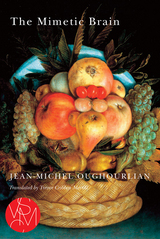
Offering up clinical studies and a complete reevaluation of classical psychiatry, Oughourlian explores the interaction among reason, emotions, and imitation and reveals that rivalry—the blind spot in contemporary neuroscientific understandings of imitation—is a misunderstood driving force behind mental illness. Oughourlian’s analyses shake the very foundations of psychiatry as we know it and open up new avenues for both theoretical research and clinical practice.
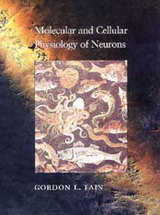
If we are to understand the brain, we must understand how the individual molecules and cells of the nervous system function and ultimately contribute to our behavior. Molecular and Cellular Physiology of Neurons provides a comprehensive and up-to-date account of what we now know—and what we want to know and can reasonably expect to discover in the near future—about the functioning of the brain at the level of molecules and cells.
Molecular and Cellular Physiology of Neurons takes readers from the fundamentals to the most sophisticated concepts and latest discoveries: from membrane potentials to recent experiments on voltage-gated ion channels, from descriptions of receptors, G proteins, effector molecules, and second messengers to an account of our current understanding of long-term potentiation.
In each chapter Fain discusses individual experiments that have made crucial contributions to our knowledge and that illustrate the techniques and approaches that have formed our present view of nerve cell function. Extensive illustrations add to this vivid account of not only what we know about cellular and molecular neurophysiology but how we know it.
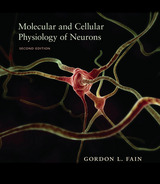
Molecular and Cellular Physiology of Neurons: Second Edition is a comprehensive, up-to-date introduction to essential concepts of cellular neuroscience. Emphasizing experimental approaches and recent discoveries, it provides an in-depth look at the structure and function of nerve cells, from protein receptors and synapses to the biochemical processes that drive the mammalian nervous system.
Starting with the basics of electrical current flow across cell membranes, Gordon Fain covers voltage gating and receptor activation in the context of channel diversity, excitatory and inhibitory synaptic transmission, neuromodulation, and sensory transduction. Emphasizing long-term processes of synaptic potentiation and depression involved in memory, consciousness, and attention, he demonstrates how cells produce neural signals and regulate signal flow to enhance or impede cell-to-cell communication. Fain also addresses the relation of molecular and cellular mechanisms to evolving theories of neurological disease and addiction.
Enhanced by more than two hundred illustrations, Molecular and Cellular Physiology of Neurons: Second Edition is intended for anyone who seeks to understand the fundamentals of nerve cell function, including undergraduate and graduate students in neuroscience, students of bioengineering and cognitive science, and practicing neuroscientists who want to deepen their knowledge of recent discoveries in molecular and cellular neurophysiology.
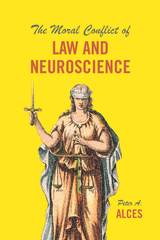
Peter A. Alces considers where and how the law currently fails to appreciate the neuroscientific revelation that humans may in key ways lack normative free will—and therefore moral responsibility. The most accessible setting in which to consider the potential impact of neuroscience is criminal law, as certain aspects of criminal law already reveal the naiveté of most normative reasoning, such as the inconsistent treatment of people with equally disadvantageous cognitive deficits, whether congenital or acquired. But tort and contract law also assume a flawed conception of human agency and responsibility. Alces reveals the internal contradictions of extant legal doctrine and concludes by considering what would be involved in constructing novel legal regimes based on emerging neuroscientific insights.
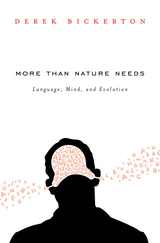
The human mind is an unlikely evolutionary adaptation. How did humans acquire cognitive capacities far more powerful than anything a hunting-and-gathering primate needed to survive? Alfred Russel Wallace, co-founder with Darwin of evolutionary theory, saw humans as "divine exceptions" to natural selection. Darwin thought use of language might have shaped our sophisticated brains, but his hypothesis remained an intriguing guess--until now. Combining state-of-the-art research with forty years of writing and thinking about language evolution, Derek Bickerton convincingly resolves a crucial problem that both biology and the cognitive sciences have hitherto ignored or evaded.
What evolved first was neither language nor intelligence--merely normal animal communication plus displacement. That was enough to break restrictions on both thought and communication that bound all other animals. The brain self-organized to store and automatically process its new input, words. But words, which are inextricably linked to the concepts they represent, had to be accessible to consciousness. The inevitable consequence was a cognitive engine able to voluntarily merge both thoughts and words into meaningful combinations. Only in a third phase could language emerge, as humans began to tinker with a medium that, when used for communication, was adequate for speakers but suboptimal for hearers.
Starting from humankind's remotest past, More than Nature Needs transcends nativist thesis and empiricist antithesis by presenting a revolutionary synthesis--one that instead of merely repeating "nature and nurture" clichés shows specifically and in a principled manner how and why the synthesis came about.
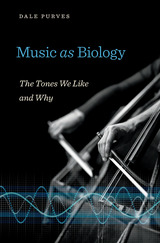
The universality of musical tones has long fascinated philosophers, scientists, musicians, and ordinary listeners. Why do human beings worldwide find some tone combinations consonant and others dissonant? Why do we make music using only a small number of scales out of the billions that are possible? Why do differently organized scales elicit different emotions? Why are there so few notes in scales? In Music as Biology, Dale Purves argues that biology offers answers to these and other questions on which conventional music theory is silent.
When people and animals vocalize, they generate tonal sounds—periodic pressure changes at the ear which, when combined, can be heard as melodies and harmonies. Human beings have evolved a sense of tonality, Purves explains, because of the behavioral advantages that arise from recognizing and attending to human voices. The result is subjective responses to tone combinations that are best understood in terms of their contribution to biological success over evolutionary and individual history. Purves summarizes evidence that the intervals defining Western and other scales are those with the greatest collective similarity to the human voice; that major and minor scales are heard as happy or sad because they mimic the subdued and excited speech of these emotional states; and that the character of a culture’s speech influences the tonal palette of its traditional music.
Rethinking music theory in biological terms offers a new approach to centuries-long debates about the organization and impact of music.

The strike of a praying mantis's forelegs is so fast that, once they are set in motion, the mantis cannot control its aim. How does it ever manage to catch a fly? A moth negotiating the night air hears the squeak of a hunting bat on the wing, and tumbles out of harm's way. How?
Insects are ideal subjects for neurophysiological studies, and at its simplest level this classic book relates the activities of nerve cells to the activities of insects, something that had never been attempted when the book first appeared in 1963. In several elegant experiments--on the moth, the cockroach, and the praying mantis--Roeder shows how stimulus and behavior are related through the nervous system and suggests that the insect brain appears to control behavior by determining which of the various built-in activity patterns will appear in a given situation. This slim volume remains invaluable to an understanding of the nervous mechanisms responsible for insect behavior.
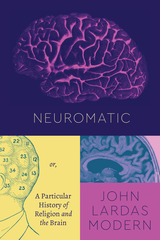
In Neuromatic, religious studies scholar John Lardas Modern offers a sprawling examination of the history of the cognitive revolution and current attempts to locate all that is human in the brain, including spirituality itself. Neuromatic is a wildly original take on the entangled histories of science and religion that lie behind our brain-laden present: from eighteenth-century revivals to the origins of neurology and mystic visions of mental piety in the nineteenth century; from cyberneticians, Scientologists, and parapsychologists in the twentieth century to contemporary claims to have discovered the neural correlates of religion.
What Modern reveals via this grand tour is that our ostensibly secular turn to the brain is bound up at every turn with the religion it discounts, ignores, or actively dismisses. In foregrounding the myths, ritual schemes, and cosmic concerns that have accompanied idealizations of neural networks and inquiries into their structure, Neuromatic takes the reader on a dazzling and disturbing ride through the history of our strange subservience to the brain.
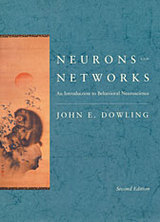
Harvard University Press is proud to announce the second edition of a widely admired introductory textbook. When first published, Neurons and Networks filled the need for an introductory neuroscience text that is lucid, accessible, authoritative, logically organized, and concise. Avoiding the encyclopedic coverage that makes most neuroscience texts overwhelming, Neurons and Networks focused instead on building the solid foundation of understanding and knowledge required for further study.
The new edition retains the features that made the first edition so attractive: consistent emphasis on results and concepts that have stood the test of time; abundant high-quality illustrations; exceptionally clear explanations of technical terms. Completely revised and enlarged with six new chapters, the second edition of Neurons and Networks is an introduction not just to neurobiology, but to all of behavioral neuroscience. It is an ideal text for first- or second-year college students with minimal college science exposure. It is also an invaluable resource for students in biology, psychology, anthropology, and computer science who seek an accessible guide to a discipline that will be a critically important area of research in the twenty-first century.

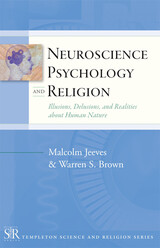
Neuroscience, Psychology, and Religion is the second title published in the new Templeton Science and Religion Series. In this volume, Malcolm Jeeves and Warren S. Brown provide an overview of the relationship between neuroscience, psychology, and religion that is academically sophisticated, yet accessible to the general reader.
The authors introduce key terms; thoroughly chart the histories of both neuroscience and psychology, with a particular focus on how these disciplines have interfaced religion through the ages; and explore contemporary approaches to both fields, reviewing how current science/religion controversies are playing out today. Throughout, they cover issues like consciousness, morality, concepts of the soul, and theories of mind. Their examination of topics like brain imaging research, evolutionary psychology, and primate studies show how recent advances in these areas can blend harmoniously with religious belief, since they offer much to our understanding of humanity's place in the world. Jeeves and Brown conclude their comprehensive and inclusive survey by providing an interdisciplinary model for shaping the ongoing dialogue.
Sure to be of interest to both academics and curious intellectuals, Neuroscience, Psychology, and Religion addresses important age-old questions and demonstrates how modern scientific techniques can provide a much more nuanced range of potential answers to those questions.
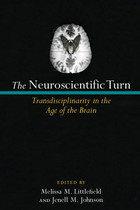
The Neuroscientific Turnbrings together 19 scholars from a variety of fields to reflect on the promises of and challenges facing emergent "neurodisciplines" such as neuroethics, neuroeconomics, and neurohistory. In the aftermath of the Decade of the Brain, neuroscience has become one of the hottest topics of study---not only for scientists but also, increasingly, for scholars from the humanities and social sciences. While the popular press has simultaneously lauded and loathed the coming "neurorevolution," the academy has yet to voice any collective speculations about whether there is any coherence to this neuroscientific turn; what this turn will and should produce; and what implications it has for inter- or transdisciplinary inquiry.
Melissa M. Littlefield and Jenell M. Johnson provide an initial framework for this most recent of "turns" by bringing together 14 original essays by scholars from the humanities, social sciences, and neurosciences. The resulting collection will appeal to neuroscientists curious about their colleagues' interest in their work; scholars and students both in established neurodisciplines and in disciplines such as sociology or English wondering about how to apply neuroscience findings to their home disciplines; and to science, technology, and society scholars and students interested in the roles of interdisciplinarity and transdisciplinarity in the construction of knowledge.


Extraordinary advances in neurochemistry are both transforming our understanding of human nature and creating an urgent problem. Much is now known about the ways that neurotransmitters influence normal social behavior, mental illness, and deviance. What are these discoveries about the workings of the human brain? How can they best be integrated into our legal system?
These explosive issues are best understood by focusing on a single neurotransmitter like serotonin, which is associated with such diverse behaviors as dominance and leadership, seasonal depression, suicide, alcoholism, impulsive homicide, and arson. This book brings together revised papers from a conference on this theme organized by the Gruter Institute for Law and Behavioral Research, supplemented with articles by leading scholars who did not attend. Contributors include psychiatrists, neurologists, social scientists, and legal scholars.
The Neurotransmitter Revolution presents a unique survey of the scientific and legal implications of research on the way serotonin combines with other factors to shape human behavior. The findings are quite different from what might have been expected even a decade ago.
The neurochemistry of behavior is not the same thing as genetic determinism. On the contrary, the activity of serotonin varies from one individual to another for many reasons, including the individual’s life experience, social status, personality, and diet. And there are a number of major neurotransmitter systems, each of which interacts with the other. Behavior, culture, and the social environment can influence neurochemistry along with inheritance. Nature and nurture interact—and these interactions can be understood from a vigorously scientific point of view.
The fact that our actions are heavily influenced by neurotransmitters like serotonin is bound to be disquieting. A sophisticated understanding of law and human social behavior will be needed if our society is to respond adequately to these rapid advances in our knowledge. This book is an essential step in that direction, providing the first comprehensive survey of the biochemical, social, and legal considerations arising from research on the behavioral effects of serotonin and related neurotransmitters.
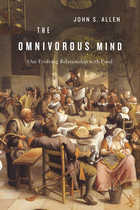
In this gustatory tour of human history, John S. Allen demonstrates that the everyday activity of eating offers deep insights into human beings’ biological and cultural heritage.
We humans eat a wide array of plants and animals, but unlike other omnivores we eat with our minds as much as our stomachs. This thoughtful relationship with food is part of what makes us a unique species, and makes culinary cultures diverse. Not even our closest primate relatives think about food in the way Homo sapiens does. We are superomnivores whose palates reflect the natural history of our species.
Drawing on the work of food historians and chefs, anthropologists and neuroscientists, Allen starts out with the diets of our earliest ancestors, explores cooking’s role in our evolving brain, and moves on to the preoccupations of contemporary foodies. The Omnivorous Mind delivers insights into food aversions and cravings, our compulsive need to label foods as good or bad, dietary deviation from “healthy” food pyramids, and cross-cultural attitudes toward eating (with the French, bien sûr, exemplifying the pursuit of gastronomic pleasure).
To explain, for example, the worldwide popularity of crispy foods, Allen considers first the food habits of our insect-eating relatives. He also suggests that the sound of crunch may stave off dietary boredom by adding variety to sensory experience. Or perhaps fried foods, which we think of as bad for us, interject a frisson of illicit pleasure. When it comes to eating, Allen shows, there’s no one way to account for taste.
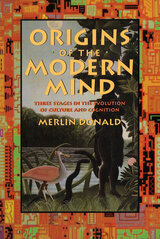
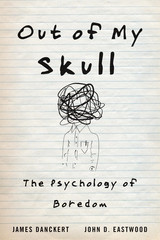
A Behavioral Scientist Notable Book of the Year
A Guardian “Best Book about Ideas” of the Year
No one likes to be bored. Two leading psychologists explain what causes boredom and how to listen to what it is telling you, so you can live a more engaged life.
We avoid boredom at all costs. It makes us feel restless and agitated. Desperate for something to do, we play games on our phones, retie our shoes, or even count ceiling tiles. And if we escape it this time, eventually it will strike again. But what if we listened to boredom instead of banishing it?
Psychologists James Danckert and John Eastwood contend that boredom isn’t bad for us. It’s just that we do a bad job of heeding its guidance. When we’re bored, our minds are telling us that whatever we are doing isn’t working—we’re failing to satisfy our basic psychological need to be engaged and effective. Too many of us respond poorly. We become prone to accidents, risky activities, loneliness, and ennui, and we waste ever more time on technological distractions. But, Danckert and Eastwood argue, we can let boredom have the opposite effect, motivating the change we need. The latest research suggests that an adaptive approach to boredom will help us avoid its troubling effects and, through its reminder to become aware and involved, might lead us to live fuller lives.
Out of My Skull combines scientific findings with everyday observations to explain an experience we’d like to ignore, but from which we have a lot to learn. Boredom evolved to help us. It’s time we gave it a chance.
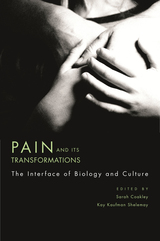
Pain is immediate and searing but remains a deep mystery for sufferers, their physicians, and researchers. As neuroscientific research shows, even the immediate sensation of pain is shaped by psychological state and interpretation. At the same time, many individuals and cultures find meaning, particularly religious meaning, even in chronic and inexplicable pain.
This ambitious interdisciplinary book includes not only essays but also discussions among a wide range of specialists. Neuroscientists, psychiatrists, anthropologists, musicologists, and scholars of religion examine the ways that meditation, music, prayer, and ritual can mediate pain, offer a narrative that transcends the sufferer, and give public dignity to private agony. They discuss topics as disparate as the molecular basis of pain, the controversial status of gate control theory, the possible links between the relaxation response and meditative practices in Christianity and Buddhism, and the mediation of pain and intense emotion in music, dance, and ritual. The authors conclude by pondering the place of pain in understanding--or the human failure to understand--good and evil in history.
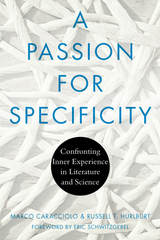
A Passion for Specificity, with its personal revelations, unexpected twists, and confrontational style, reads like an epistolary novel, but it is a serious exploration of ideas at the heart of literature and science. It is a thoughtful attempt at advancing the emerging “cognitive humanities,” clarifying a number of core issues in the cross-pollination of literature, psychology, philosophy, and consciousness science.

The cerebral cortex, occupying over 70 percent of our brain mass, is key to any understanding of the workings--and disorders--of the human brain. offering a comprehensive account of the role of the cerebral cortex in perception, this monumental work by one of the world's greatest living neuroscientists does nothing short of creating a new subdiscipline in the field: perceptual neuroscience.
For this undertaking, Vernon Mountcastle has gathered information from a vast number of sources reaching back through two centuries of investigation into the intrinsic operations of the cortex. His survey includes phylogenetic, comparative, and neuroanatomical studies of the neocortex; studies of the large-scale organization of the neocortex, of neuronal histogenesis and the specification of cortical areas, of synaptic transmission between neurons in cortical microcircuits, and of rhythmicity and synchronization in neocortical networks; and inquiries into the binding problem--how activities among the separate processing nodes of distributed systems coalesce in a coherent activity that we call perception.
The first book to summarize what is known about the physiology of the cortex in perception, Perceptual Neuroscience will be a landmark in the literature of neuroscience.
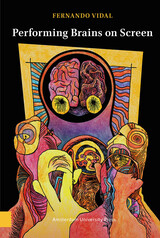
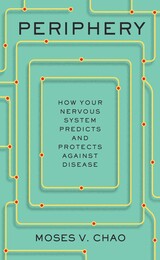
A leading neuroscientist argues that the peripheral nervous system, long understood to play a key role in regulating basic bodily functions, also signals the onset of illness.
The central nervous system, consisting of the brain and the spinal cord, has long been considered the command center of the body. Yet outside the central nervous system, an elaborate network of nerve cells and fibers extends throughout our bodies, transmitting messages between the brain and other organs. The peripheral nervous system, as it’s known, regulates such vital functions as heart rate, digestion, and perspiration and enables us to experience the barrage of sounds, tastes, smells, and other sensory information that surrounds us. But beyond these crucial roles, the peripheral nervous system might do even more: it might warn us of diseases in our future.
As Moses Chao argues in Periphery, from Parkinson’s disease to autism to dementia, many neurological conditions emerge not in the brain but rather within the peripheral nervous system, in the dense network of nerves that wrap around the gastrointestinal tract. What’s more, dysfunctions of the peripheral nervous system can signal the onset of disease decades before symptoms like tremor or memory loss occur. Fortunately, unlike nerves in the brain and spinal cord, peripheral nerves can heal and regenerate in response to injury and aging. The therapeutic implications are remarkable. Chao shows how, with a better understanding of the peripheral nervous system, we could not only predict and treat neurological diseases long before their onset, but possibly prevent them altogether.
Full of new ideas and bold interpretations of the latest data, Periphery opens exciting avenues for medical research while deepening our understanding of a crucial yet underappreciated biological system.

In this wide-ranging book, one of the boldest thinkers in modern neuroscience confronts an ancient philosophical problem: can we know the world as it really is?
Drawing on provocative new findings about the psychophysiology of perception and judgment in both human and nonhuman primates, and also on the cultural history of science, Jean-Pierre Changeux makes a powerful case for the reality of scientific progress and argues that it forms the basis for a coherent and universal theory of human rights. On this view, belief in objective knowledge is not a mere ideological slogan or a naïve confusion; it is a characteristic feature of human cognition throughout evolution, and the scientific method its most sophisticated embodiment. Seeking to reconcile science and humanism, Changeux holds that the capacity to recognize truths that are independent of subjective personal experience constitutes the foundation of a human civil society.
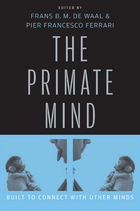
“Monkey see, monkey do” may sound simple, but how an individual perceives and processes the behavior of another is one of the most complex and fascinating questions related to the social life of humans and other primates. In The Primate Mind, experts from around the world take a bottom-up approach to primate social behavior by investigating how the primate mind connects with other minds and exploring the shared neurological basis for imitation, joint action, cooperative behavior, and empathy.
In the past, there has been a tendency to ask all-or-nothing questions, such as whether primates possess a theory of mind, have self-awareness, or have culture. A bottom-up approach asks, rather, what are the underlying cognitive processes of such capacities, some of which may be rather basic and widespread. Prominent neuroscientists, psychologists, ethologists, and primatologists use methods ranging from developmental psychology to neurophysiology and neuroimaging to explore these evolutionary foundations.
A good example is mirror neurons, first discovered in monkeys but also assumed to be present in humans, that enable a fusing between one’s own motor system and the perceived actions of others. This allows individuals to read body language and respond to the emotions of others, interpret their actions and intentions, synchronize and coordinate activities, anticipate the behavior of others, and learn from them. The remarkable social sophistication of primates rests on these basic processes, which are extensively discussed in the pages of this volume.

Most neurology is done by general physicians rather than by neurologists. Still, neurology is perceived by doctors to be one of the most troublesome and difficult medical specialties. Neurologic symptoms are often vague and uncertain, and seemingly insignificant symptoms can reflect frightening disorders.
Thomas Glick, a superb teacher as well as an experienced clinician, has written this book in the belief that errors in handling neurologic cases stem not so much from a failure to command a daunting body of knowledge as from inadequate clinical reasoning. Dr. Glick shows how the skills of the primary-care physician can be applied to the special problems of neurologic history-taking and physical examination. He emphasizes time-saving ways to focus the exam and avoid diagnostic error. The book describes clear procedures for cases that the generalist can handle comfortably and offers guidelines on when (and how) to seek the advice of the consultant neurologist. Case histories, scattered liberally throughout the text, highlight the discussions and give the reader a rich sampling of specific methods of problem solving.
Clinicians who feel skeptical about the effectiveness of neurologic therapy or frustrated by its application will find here a commonsense approach to therapeutic planning. Chapters on ambulatory and chronic neurologic care also convey a positive sense of the broader therapeutic possibilities that exist in neurologic practice. Neurologic residents, senior medical students, psychiatrists, and allied health professionals, as well as primary caregivers, will benefit from the insights contained in this sensitive and articulate book.

Because Christianity and psychology deal with different levels of truth and speak vastly different languages, efforts to unify them often create more problems than they solve. What is needed is a better way to think about the relationship—an approach that does justice to the emerging insights from psychological science and biblical scholarship and that can enrich our understanding of both. In this volume, two accomplished psychologists show how this complementary dialogue can unfold, giving us a broader, deeper understanding of ourselves, our relationships, and our place in the cosmos.
.
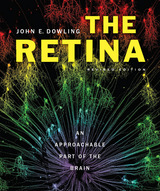
John Dowling’s The Retina, published in 1987, quickly became the most widely recognized introduction to the structure and function of retinal cells. In this Revised Edition, Dowling draws on twenty-five years of new research to produce an interdisciplinary synthesis focused on how retinal function contributes to our understanding of brain mechanisms.
The retina is a part of the brain pushed out into the eye during development. It retains many characteristics of other brain regions and hence has yielded significant insights on brain mechanisms. Visual processing begins there as a result of neuronal interactions in two synaptic layers that initiate an analysis of space, color, and movement. In humans, visual signals from 126 million photoreceptors funnel down to one million ganglion cells that convey at least a dozen representations of a visual scene to higher brain regions.
The Revised Edition calls attention to general principles applicable to all vertebrate retinas, while showing how the visual needs of different animals are reflected in their retinal variations. It includes completely new chapters on color vision and retinal degenerations and genetics, as well as sections on retinal development and visual pigment biochemistry, and presents the latest knowledge and theories on how the retina is organized anatomically, physiologically, and pharmacologically.
The clarity of writing and illustration that made The Retina a book of choice for a quarter century among graduate students, postdoctoral fellows, vision researchers, and teachers of upper-level courses on vision is retained in Dowling’s new easy-to-read Revised Edition.

This intimate memoir—tenuous, shifting, sometimes humorous—demonstrates Skloot’s considerable literary skill honed as an award-winning essayist, memoirist, novelist, and poet. His recollections of a strange, spinning world prompt further musings on the forces of uncertainty, change, and displacement that have shaped him from childhood to late middle age, repeatedly knocking him awry, realigning his hopes and plans, even his perceptions. From the volatile forces of his mercurial, shape-shifting early years to his obsession with reading, acting, and writing, from the attack of vertigo to a trio of postvertigo (but nevertheless dizzying) journeys to Spain and England, and even to a place known only in his mother’s unhinged fantasies, Skloot makes sense of a life’s phantasmagoric unpredictability.
Finalist, Sarah Winnemucca Award for Creative Nonfiction, Oregon Book Awards

The implications of early experience for children’s brain development, behavior, and psychological functioning have long absorbed caregivers, researchers, and clinicians. The 1989 fall of Romania’s Ceausescu regime left approximately 170,000 children in 700 overcrowded, impoverished institutions across Romania, and prompted the most comprehensive study to date on the effects of institutionalization on children’s wellbeing. Romania’s Abandoned Children, the authoritative account of this landmark study, documents the devastating toll paid by children who are deprived of responsive care, social interaction, stimulation, and psychological comfort.
Launched in 2000, the Bucharest Early Intervention Project (BEIP) was a rigorously controlled investigation of foster care as an alternative to institutionalization. Researchers included 136 abandoned infants and toddlers in the study and randomly assigned half of them to foster care created specifically for the project. The other half stayed in Romanian institutions, where conditions remained substandard. Over a twelve-year span, both groups were assessed for physical growth, cognitive functioning, brain development, and social behavior. Data from a third group of children raised by their birth families were collected for comparison.
The study found that the institutionalized children were severely impaired in IQ and manifested a variety of social and emotional disorders, as well as changes in brain development. However, the earlier an institutionalized child was placed into foster care, the better the recovery. Combining scientific, historical, and personal narratives in a gripping, often heartbreaking, account, Romania’s Abandoned Children highlights the urgency of efforts to help the millions of parentless children living in institutions throughout the world.
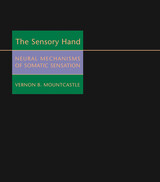
The hand is an organ of considerable capability. With it we feel, point, and reach, we determine the texture and shape of objects we palpate, we emit and receive signs of approval, compassion, condolence, and encouragement, and, on a different register, rejection, threat, dislike, antagonism, and attack.
Vernon Mountcastle has devoted his career to studying the neurophysiology of sensation--the extended sensory surface, consisting of skin and subcutaneous tissue--in the hand. In The Sensory Hand Mountcastle provides an astonishingly comprehensive account of the neural underpinnings of the rich and complex tactile experiences evoked by stimulation of the hand. Mountcastle focuses attention on the nerve pathways linking the hand to central neural structures, structures that play a role in several other aspects of somatic sensation. His new book thus becomes a sequel to his earlier volume, Perceptual Neuroscience, in which he offered a detailed analysis of the role of the distributed systems of the neocortex in perception generally.
Written by one of the giants of modern neuroscience and the first single-authored book-length treatment of the subject, The Sensory Hand is a major work of scholarship that will be essential reading for anyone interested in how the brain registers sensation and perception.
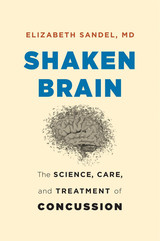
A physician with thirty-five years of experience treating people with brain injuries shares the latest research on concussions and best practices for care.
The explosion of attention to sports concussions has many of us thinking about the addled brains of our football and hockey heroes. But concussions happen to everyone, not just elite athletes. Children fall from high chairs, drivers and cyclists get into accidents, and workers encounter unexpected obstacles on the job. Concussions are prevalent, occurring even during everyday activities. In fact, in less time than it takes to read this sentence, three Americans will experience a concussion. The global statistics are no less staggering.
Shaken Brain offers expert advice and urgently needed answers. Elizabeth Sandel, MD, is a board-certified physician who has spent more than three decades treating patients with traumatic brain injuries, training clinicians, and conducting research. Here she explains the scientific evidence for what happens to the brain and body after a concussion. And she shares stories from a diverse group of patients, educating readers on prevention, diagnosis, and treatment. Few people understand that what they do in the aftermath of their injury will make a dramatic difference to their future well-being; patient experiences testify to the best practices for concussion sufferers and their caregivers. Dr. Sandel also shows how to evaluate risks before participating in activities and how to use proven safety strategies to mitigate these risks.
Today concussions aren’t just injuries—they’re big news. And, like anything in the news, they’re the subject of much misinformation. Shaken Brain is the resource patients and their families, friends, and caregivers need to understand how concussions occur, what to expect from healthcare providers, and what the long-term consequences may be.


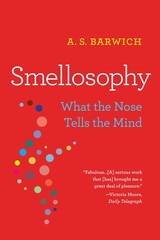
An NRC Handelsblad Book of the Year
“Offers rich discussions of olfactory perception, the conscious and subconscious impacts of smell on behavior and emotion.”
—Science
Decades of cognition research have shown that external stimuli “spark” neural patterns in particular regions of the brain. We think of the brain as a space we can map: here it responds to faces, there it perceives a sensation. But the sense of smell—only recently attracting broader attention in neuroscience—doesn’t work this way. So what does the nose tell the brain, and how does the brain understand it?
A. S. Barwich turned to experts in neuroscience, psychology, chemistry, and perfumery in an effort to understand the mechanics and meaning of odors. She discovered that scents are often fickle, and do not line up with well-defined neural regions. Upending existing theories of perception, Smellosophy offers a new model for understanding how the brain senses and processes odors.
“A beguiling analysis of olfactory experience that is fast becoming a core reference work in the field.”
—Irish Times
“Lively, authoritative…Aims to rehabilitate smell’s neglected and marginalized status.”
—Wall Street Journal
“This is a special book…It teaches readers a lot about olfaction. It teaches us even more about what philosophy can be.”
—Times Literary Supplement
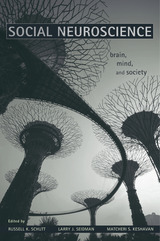
Human beings evolved in the company of others and flourish in proportion to their positive social ties. To understand the human brain, we must situate its biology in the wider context of society. To understand society, we must also consider how the brains and minds of individuals shape interactions with other human beings. Social Neuroscience offers a comprehensive new framework for studying the brain, human development, and human behavior.
In this book, leading researchers in the fields of neurobiology, psychiatry, psychology, and sociology elucidate the connections between brain biology and the brain’s functioning in the social world, providing a state-of-the-art interdisciplinary explanation of how humans think and act, as well as the ways we define and treat pathological behavior. Synthesizing the insights and perspectives of these experts, Social Neuroscience examines how neural processes make the brain sensitive to social experience, how cognition shapes social behavior, and how social networks create a range of responses among different individuals to the same environmental stimuli.
The mutually reinforcing connections between brain, mind, and society have profound implications for human health, from the emotionally damaging effects of severe social deprivation to the neurological impact of parental abuse and neighborhood violence. The authors explore these connections, with special focus on mental illnesses, including schizophrenia—a disorder characterized by marked social deficits in which a neurological basis is now well established.
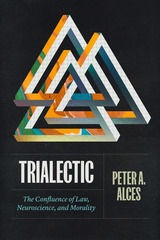
A thought-provoking examination of how insights from neuroscience challenge deeply held assumptions about morality and law.
As emerging neuroscientific insights change our understanding of what it means to be human, the law must grapple with monumental questions, both metaphysical and practical. Recent advances pose significant philosophical challenges: how do neuroscientific revelations redefine our conception of morality, and how should the law adjust accordingly?
Trialectic takes account of those advances, arguing that they will challenge normative theory most profoundly. If all sentient beings are the coincidence of mechanical forces, as science suggests, then it follows that the time has come to reevaluate laws grounded in theories dependent on the immaterial that distinguish the mental and emotional from the physical. Legal expert Peter A. Alces contends that such theories are misguided—so misguided that they undermine law and, ultimately, human thriving.
Building on the foundation outlined in his previous work, The Moral Conflict of Law and Neuroscience, Alces further investigates the implications for legal doctrine and practice.
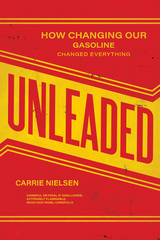
Unleaded tells the story of how crusading scientists and activists convinced the U.S. government to ban lead additives in gasoline. It also reveals how, for nearly fifty years, scientific experts paid by the oil and mining industries abused their authority to convince the public that leaded gasoline was perfectly harmless.
Combining environmental history, sociology, and neuroscience, Carrie Nielsen explores how lead exposure affects the developing brains of children and is linked to social problems including academic failure, teen pregnancies, and violent crime. She also shows how, even after the nationwide outrage over Flint’s polluted water, many poor and minority communities and communities of color across the United States still have dangerously high lead levels. Unleaded vividly depicts the importance of sound science and strong environmental regulations to protect our nation’s most vulnerable populations.
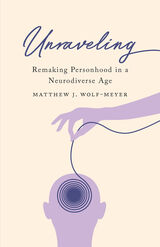
Developing a cybernetic model of subjectivity and personhood that honors disability experiences to reconceptualize the category of the human
Twentieth-century neuroscience fixed the brain as the basis of consciousness, the self, identity, individuality, even life itself, obscuring the fundamental relationships between bodies and the worlds that they inhabit. In Unraveling, Matthew J. Wolf-Meyer draws on narratives of family and individual experiences with neurological disorders, paired with texts by neuroscientists and psychiatrists, to decenter the brain and expose the ableist biases in the dominant thinking about personhood.
Unraveling articulates a novel cybernetic theory of subjectivity in which the nervous system is connected to the world it inhabits rather than being walled off inside the body, moving beyond neuroscientific, symbolic, and materialist approaches to the self to focus instead on such concepts as animation, modularity, and facilitation. It does so through close readings of memoirs by individuals who lost their hearing or developed trauma-induced aphasia, as well as family members of people diagnosed as autistic—texts that rethink modes of subjectivity through experiences with communication, caregiving, and the demands of everyday life.
Arguing for a radical antinormative bioethics, Unraveling shifts the discourse on neurological disorders from such value-laden concepts as “quality of life” to develop an inclusive model of personhood that honors disability experiences and reconceptualizes the category of the human in all of its social, technological, and environmental contexts.
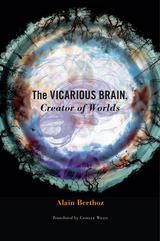
Groping around a familiar room in the dark, or learning to read again after a traumatic brain injury; navigating a virtual landscape through an avatar, or envisioning a scene through the eyes of a character—all of these are expressions of one fundamental property of life, Alain Berthoz argues. They are instances of vicariance, when the brain sidesteps an impasse by substituting one process or function for another. In The Vicarious Brain, Creator of Worlds, Berthoz shows that this capacity is the foundation of the human ability to think creatively and function in a complex world.
Vicariance is often associated with proxies and delegates, but it also refers to a biological process in which a healthy organ takes over for a defective counterpart. Berthoz, a neuroscientist, approaches vicariance through neuronal networks, asking how, for example, a blind person can develop a heightened sense of touch. He also describes how our brains model physical reality and how we use these models to understand things that are foreign to us. Forging across disciplinary boundaries, he explores notions of the vicarious in paleontology, ethology, art, literature, and psychology.
Through an absorbing examination of numerous facets of vicariance, Berthoz reveals its impact on an individual’s daily decision making and, more broadly, on the brain’s creation of worlds. As our personal and social lives are transformed by virtual realities, it is more crucial than ever before that we understand vicariance within our increasingly complex environment, and as an aspect of our own multiplying identities.
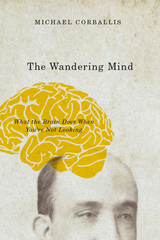
That may be bad news for me, but is it bad news for people in general? Does the fact that as much as fifty percent of our waking hours find us failing to focus on the task at hand represent a problem? Michael Corballis doesn’t think so, and with The Wandering Mind, he shows us why, rehabilitating woolgathering and revealing its incredibly useful effects. Drawing on the latest research from cognitive science and evolutionary biology, Corballis shows us how mind-wandering not only frees us from moment-to-moment drudgery, but also from the limitations of our immediate selves. Mind-wandering strengthens our imagination, fueling the flights of invention, storytelling, and empathy that underlie our shared humanity; furthermore, he explains, our tendency to wander back and forth through the timeline of our lives is fundamental to our very sense of ourselves as coherent, continuing personalities.
Full of unusual examples and surprising discoveries, The Wandering Mind mounts a vigorous defense of inattention—even as it never fails to hold the reader’s.

What Freud Didn't Know, well-supported by research and groundbreaking in theory, combines neuroscience and psychology to explain how the amygdala region of the brain evolved to unconsciously record, store, and activate emotional memory loops and imagery associated with painful events, especially those of childhood. This book is the first to bring together diverse, post-Freudian discoveries to produce a coherent three-step practice for understanding problematic aspects of the human mind which can be mastered easily, in a clinical or self-help setting. Stokes explores recent breakthroughs, many in marked contrast to Freud's views, which will change how we view psychological and emotional problems and their treatments.
Grounded in current theories about brain circuitry, What Freud Didn't Know integrates ideas about mindfulness, habitual thinking, and insight imagery and provides readers with the tools to rescript their personal narratives for psychological well-being. As an alternative approach to treating stress, most types of depression, anxiety, and phobias without prescription drugs, Stokes's three-step practice can be used to build resiliency and inner peace.

Torture is banned because it is cruel and inhumane. But as Shane O’Mara writes in this account of the human brain under stress, another reason torture should never be condoned is because it does not work the way torturers assume it does.
In countless films and TV shows such as Homeland and 24, torture is portrayed as a harsh necessity. If cruelty can extract secrets that will save lives, so be it. CIA officers and others conducted torture using precisely this justification. But does torture accomplish what its defenders say it does? For ethical reasons, there are no scientific studies of torture. But neuroscientists know a lot about how the brain reacts to fear, extreme temperatures, starvation, thirst, sleep deprivation, and immersion in freezing water, all tools of the torturer’s trade. These stressors create problems for memory, mood, and thinking, and sufferers predictably produce information that is deeply unreliable—and, for intelligence purposes, even counterproductive. As O’Mara guides us through the neuroscience of suffering, he reveals the brain to be much more complex than the brute calculations of torturers have allowed, and he points the way to a humane approach to interrogation, founded in the science of brain and behavior.
Torture may be effective in forcing confessions, as in Stalin’s Russia. But if we want information that we can depend on to save lives, O’Mara writes, our model should be Napoleon: “It has always been recognized that this way of interrogating men, by putting them to torture, produces nothing worthwhile.”
READERS
Browse our collection.
PUBLISHERS
See BiblioVault's publisher services.
STUDENT SERVICES
Files for college accessibility offices.
UChicago Accessibility Resources
home | accessibility | search | about | contact us
BiblioVault ® 2001 - 2024
The University of Chicago Press









